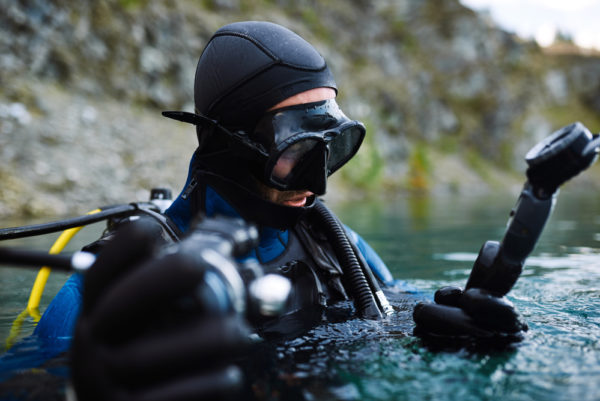
How long will the air in your scuba tank last?
This is a great question many new, novice and some experienced divers ask me. There really isn’t a definitive answer because it really depends on your level of scuba dive experience and dive skills.
What I can say for sure is that if your breathing and buoyancy are well controlled, knowing your tank size, the type of diving you do and the depth you dive down to will help you determine a reasonable estimate on how long your tank of air will last.
Many new and novice divers generally consume more air in their tank and therefore end up with shorter dives.
In this article, I talk about 6 great factors that determine how long your air will last in your tank along with an interesting video for you to watch. I hope you enjoy reading this.
Ok, So How Long Will My Tank Last Me?
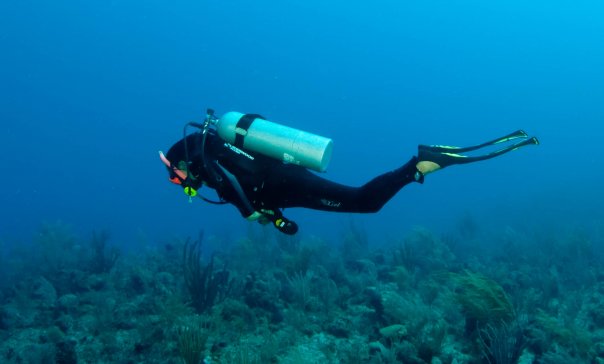
When I first started diving, some of my tour guides wanted to be informed when I reached 700 – 800 psi of air in my single 80 cu ft tank.
It seemed I was always the first to give the hand signal and then, of course, the guide signaled to the other divers it was time to turn around. Feeling full of guilt because everyone ended up with a short dive including my dive buddy it was time to figure out what I was doing wrong.
I started to observe how the experienced divers appeared to dive ‘sleepy’ and I asked them lots of questions.
I was definitely a yo-yo diver, bobbing up and down, up and down… but, what I found was, the more dives I did and followed their advice on learning more skills, I became a confident diver.
So how long will the air in my tank last me now?
Please don’t think of me as boasting when I answer this. I can be underwater for an hour and come back to the surface with 2000 psi and yes I am quite consistent on that number.
I would love to stay down longer but my tour guide and the dive group who are now back on the boat, are waiting for me to surface.
There are, of course, some things you should understand. This comes from the training of your Open Water Diver course. As a refresher, I have included a video for you to watch…
6 Factors Determine How Long Your Air Will Last In Tank
1) Tanks
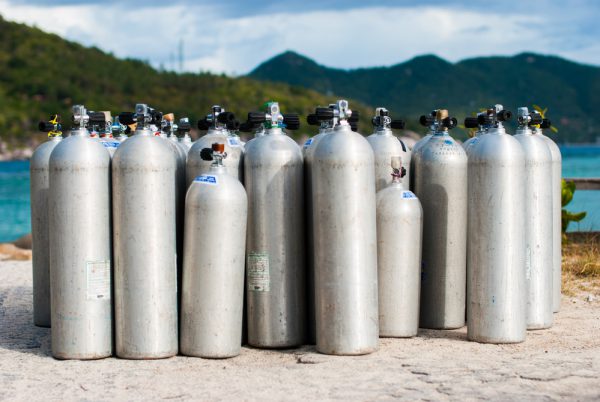
Tanks come in different sizes, some large, some small and the tank material can be aluminum or steel which are heavier to lift. Recreational divers dive with a single tank.
The most popular aluminum tank is 80 cu ft measuring 26″ long and holds 3000psi/200 bar of compressed air. The tank size you choose determines the amount of air it contains.
If you intend to dive longer and deeper without doing any specialized technical diving like cave diving, the 80 cu ft is still good within your recreational dive depth of 130’/40 meters.
Petite divers sometimes prefer using the shorter tank to prevent it from banging at the back of their head.
2) Depth
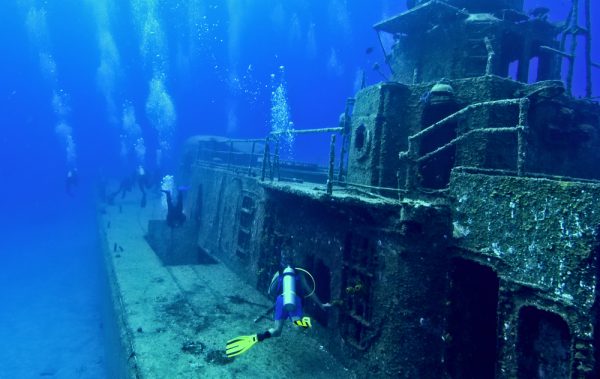
Do you know that the deeper you dive the faster you consume the air in your tank?
Water is denser and weighs more than our air. Even if you dive down to 10 meters/33 feet you use up 2 times the volume of air you consume at the surface. You feel the physical force on your body from the pressures from the air and from the water above and all around you.
Now picture yourself if you went down 100’, that’s 4 times more regular pressure on your body and your lungs contract even more. You might find the air harder to breathe.
It takes 4 times more air to efficiently fill your lungs.
3) Rate Of Air Consumption
If you have a large body mass, you most likely have large lungs and will need to use more air to fill your lungs than a diver who’s small or petite with smaller lungs.
The amount of air you use from the tank will determine how long you last underwater. How fast your consumption of air also depends on whether you are:
- A bobber
- Challenged with anxieties
- A new diver
- A smoker
4) Your Comfort Level Underwater
Diving with uncontrolled buoyancy will surely cause you to use more air from your tank.
Bobbing up and down and fighting to stay down with the dive group, flailing your arms, is wasted energy.
Having stress and even lack of dive experience are all factors of more air being used. This is why you were taught to relax, and take deep breaths slowly when diving.
5) Smoking
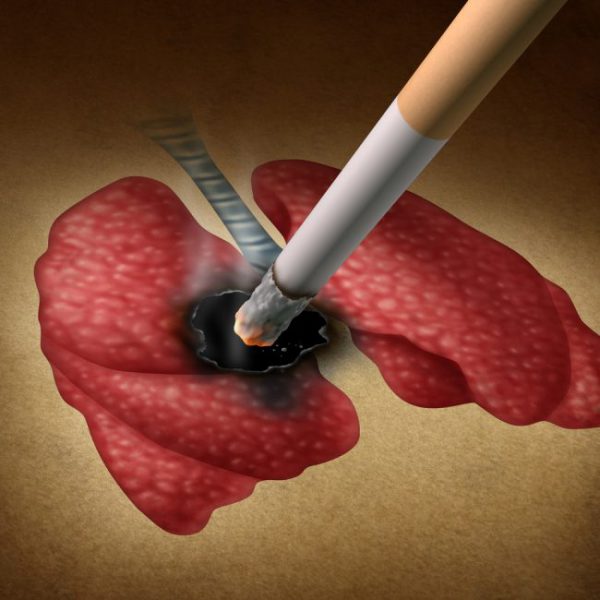
Some of you may smoke and may wonder what smoking has to do with diving.
Smoking has a huge effect on your body when diving and it really doesn’t matter whether you’re a ‘casual’ smoker or a ‘heavy smoker’.
You could already be feeling some kind of effect underwater and because denial goes a long way ‘Who, Me’, sometimes you just don’t have time to listen to your body. That denial can cost you your life especially when diving underwater.
Did you know, smoking cigarettes robs your body of oxygen?
We all have a small amount of carbon monoxide in us, it’s naturally produced.
Cigarettes are composed of many chemicals, nicotine, and tar with dangerous substances and gaseous compounds including carbon monoxide.
Well, that carbon monoxide from the cigarettes that you inhale sticks to your red blood cells literally taking the valuable space of where the oxygen needs to go. Your arteries become clogged with carbon monoxide.
Now picture yourself underwater with all that weight of the water on top of you and all around you.
The deeper you go, your lungs have already contracted, and you’re now facing shortness of breath. You struggle to breathe, your heart works faster and before you know it, you used up a lot of air in your tank before you’re halfway thru.
Want to stay down longer? You know what to do!
6) New or Novice Diver
As the saying goes ‘practice makes perfect’.
The more dives you do, the better your breathing becomes and you get more bottom time. There are 2 ways to accomplish this.
The first is keep diving as much as possible and the second is to enroll in more fun dive courses thru PADI.
Courses like their Peak Buoyancy, Advanced Open Water Diver Certification, and Rescue Diver Course Certification are excellent ways to learn more dive skills plus you get to do more dives. Any dive anxieties you have can be addressed during your additional training plus you get to meet lots of like-minded divers with the same goals.
More confidence, more air in your tank!
How Much Air Do You Come Back With?
Do you have stories you would like to share on your air experiences? How much air do you come back to the surface with? How are you improving your dive skills?
If you have any questions or comments, it would be awesome to hear from you.
Thanks for reading.
Monica

I have been considering scuba diving for some time now and I always wondered how long the air lasts. It is very important to know when you are 25 ft underwater. It means the difference between a rapid ascent and a slow one.
I do have a question though. I weigh 180 lbs and I am an athlete. How long do you think a tank would last for me? I look forward to hearing your answer.
Thank you for sharing and I hope you make it a great day!
Hi Alex,
Thank you for reading my article. Good question. It still really depends on how comfortable you are in water. That’s great, you’re definitely in shape, so let’s assume you have good neutral buoyancy and your breathing is controlled, your tank is 80 cu ft which holds 3000 psi of compressed air. 25′ is not a deep dive, and say you’re a relatively new diver, you might come back with about 1400 psi. If you hook up with dive shops, you will have a tour guide who will guide you to places underwater and lead you back safely to the boat and so your dive time will be at least an hour. This gives you plenty of air reserve in your tank in the event your dive buddy needs to share your air with you and still return to the boat.
I hope this helps.
Regards,
Monica